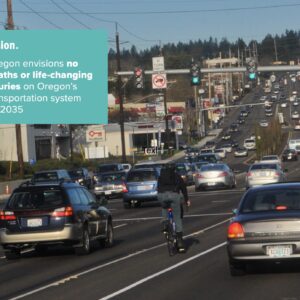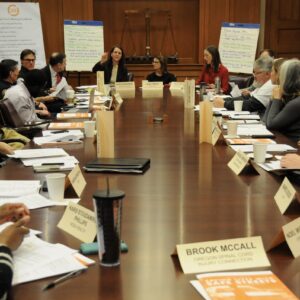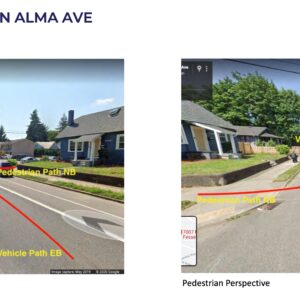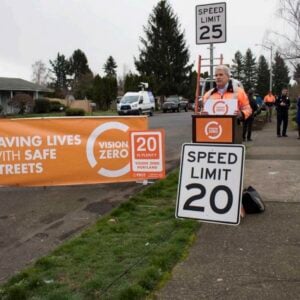
Noted “Safety in Numbers” researcher and public health consultant Peter Jacobsen will bring the “Vision Zero” traffic safety concept to Portland on Friday. Jacobsen will speak about the topic as part of a seminar at Portland State University’s Center for Transportation Studies.
Jacobsen is currently in Salem where he’s taking part in the Oregon Traffic Safety Conference. Tomorrow, he’ll give a presentation on the links between transportation and health that will be followed by a Vision Zero workshop with ODOT State Traffic Engineer Ed Fischer.
Vision Zero began in Sweden in 1997 as a program with the goal of eliminating all traffic fatalities and serious injuries by 2020.
Here’s more from a description of the event on Friday:
“Vision Zero is built around the basic idea that even if not all traffic crashes can be avoided, all severe injuries can, in principle, be avoided. Building a “safe system,” where all predicted crashes have tolerable health losses, requires a new roadway design philosophy. This new philosophy calls for shifting from the traditional preventing crashes to preventing health harm. This shift calls for switching from designing roads to have space for evasive action to managing the kinetic energy transferred in crashes to human bodies to be within its injury tolerance.”
It might sound crazy and audacious; but is it any crazier than accepting the daily carnage and tens of thousands of deaths and injuries on our roads each year?
I’m hoping to chat with Jacobsen for a quick interview sometime in the next few days. Stay tuned for that.
- Peter Jacobsen – Vision Zero: Towards Zero Deaths
Friday, October 15 at 12 noon
PSU Urban Center Room 204)
Free and open to the public
More info here





WOW. This is awesome and Jacobson sounds like a great influence for change. Don’t know if he’ll be able to pull ODOT’s head out of (you know). That would be magnificent. I truly hope that you can get some time to interview him. I would love to hear him speak
Fascinating.
“switching from designing roads to have space for evasive action to managing the kinetic energy transferred in crashes to human bodies to be within its injury tolerance.”
– of course switching to bikes also solve the kinetic energy problem he’s tackling for cars. 🙂
I really like this line of thinking.
“…managing the kinetic energy transferred in crashes to human bodies to be within its injury tolerance.”
How is this different from the philosophy that brought us seatbelts, airbags, crumple zones, and helmets? I would vastly prefer attentive operators avoiding crashes to bouncing off of the vehicles of space cadets cocooned in their kinetic energy-mitigating bubbles.
Perhaps there is not enough info contained in this excerpt, but this “new paradigm” doesn’t sound like anything much different than the vehicle arms race we are already fostering by promoting the “safety” (for their occupants) of ever-more-heavily-armored SUVs. As a cyclist, my best crash energy management technique is avoidance, which requires a little extra room to take evasive action. Maybe I should just sign up for that Aikido class I’ve been thinking about, so when I am squeezed into an unavoidable crash, at least I know how to take the fall.
el biciclero,
it’s actually completely different than the “vehicle arms race” we’re currently in. i’ve got a Q&A with jacobsen posting soon that will hopefully clarify this more.
For cyclists “Vision Zero” is good only in theory. Because motorized traffic outnumbers cyclists, investments in traffic safety for motorists are considered more cost effective. Therefore, all major investments will be directed at motorized traffic.
In Sweden, it’s very clear that “Vision Zero” almost ignores traffic saftey for cyclists. The most striking example is the conversion of two lane main roads into a special type of three-lane road, called “2+1-road”. On the 2+1-roads the space for cyclists is reduced to 10 (!) inch or less. Cars and trucks is blowing 60 mph just besides you. See what it looks like here and here. Sometimes the 2+1-road can be avoided by a detour. Sometimes no alternative routes exists. Traffic Safety at its worst.
Cheers from Sweden!
Building a “safe system,” where all predicted crashes have tolerable health losses – What this requires is eliminating the “Culture of Speed”. If all vehicle speeds are reduced to 20mph or below (in the urban areas), the “accident” rate drops to a fraction of its current value, deaths drop effectively to nothing, and serious injuries also see a serious decline.
Ultimately, all of this eventually involves a cultural change – urban roads cannot be practically re-engineered to support that type of system without involving cultural change – and unfortunately cultural change has an even longer time horizon than infrastructure changes.
“…it’s actually completely different than the “vehicle arms race” we’re currently in.”
I hope so. I just don’t see how continuing to expect crashes–just less energetic ones–helps a cyclist who is already going relatively slowly and has virtually no methods available for mitigating the energy involved other than “evasive action”. If given a choice between getting hit by a car at 30mph and getting hit by a car at 20mph, I’ll still choose not getting hit at all…
i am not sure it is true that cultural change needs to have a very long time horizon. i grew up in the 50s and 60s, and i can tell you that the idea that anyone “needs” two cars or two (or ten) televisions, or any television that is an effective substitute for a cinema screen, or a telephone that you can take around with you, or beef three times a week at some fraction of an hour’s wage, etc., etc., etc. was completely foreign then. it was very effectively sold to us overnight by people who wanted to put us to work buying their private jets for them. it could be reversed just as quickly if the incentives were right.
are @ 9
“it was very effectively sold to us overnight by people who wanted to put us to work buying their private jets for them. it could be reversed just as quickly if the incentives were right.”
It is true that most of the stuff we’ve gotten used to has been sold to us, often against a lot of fierce opposition which we quickly forget/is not taught in schools. But this doesn’t mean it can be undone easily or quickly. Not everything that is pushed on us by commercial interests succeeds. >90% of all new products fail. The other side of the equation is that we (or those of us with money) get used to or become habituated to this cutting edge crap. Talking people out of products they identify with, whether it is the remote control, auto defrost, or a breakfast cereal isn’t going to be so simple.
It doesn’t mean we shouldn’t try, just that we need to keep our eyes open.
are– I think matt means that cultural change for good has a very long time horizon. It’s easy to pander to peoples’ desire for status, entertainment, and convenience; it’s hard to get people to accept perceived loss of those things. The person who can sell slowing down and sacrificing some of your own entertainment or convenience for others’ safety as “cool” is a true genius. What kind of kid is going to choose a carrot over a candy bar?